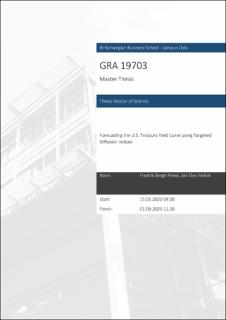| dc.description.abstract | We investigate possible empirical linkages between variation in the U.S. Treasury
yield curve and several measures of economic and financial activity by the
methodology targeted diffusion index forecasting. First, we model the entire yield
curve with the Nelson-Siegel exponential components framework period-by-period,
thereby distilling the yield curve into three, dynamic parameters. We show that
these three parameters can be interpreted as yield curve factors corresponding to
level, slope and curvature, and that their variation explain almost all yield curve
variation. We then use targeted diffusion indices estimated from a set of 1196 different
macroeconomic and financial variables to produce both in-sample and out-ofsample
forecasts these three parameters, thus obtaining forecasts of the the entire
yield curve. While we do find in-sample predictability of the Nelson-Siegel dynamic
paramaters by the targeted diffusion indices, we do not find that they are able to
produce better out-of-sample forecasts than the competitor models. Additionally,
we find that the established Diebold-Li yield curve forecasting model, which has
previously been found to produce superior forecasts, is outperformed by a simple
random walk model. Our findings on a new, updated sample thus contradict earlier
findings. | en_US |
